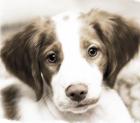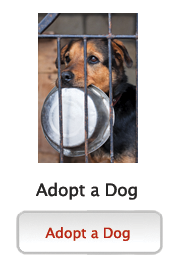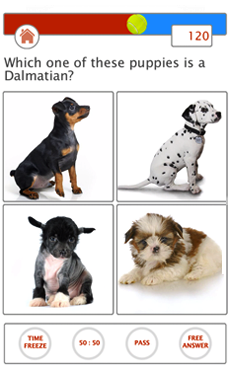Brittany

In my own words
My favourite hobbies including bird hunting, roaming and I love a good splash in the water. So my ideal pack residency would definitely be that of space, lots of country land would tick all my boxes. Due to my great stamina and need for exercise being cooped up in an apartment wouldn’t make me a happy dog at all, resulting in me chewing and destroying anything I get my teeth into. I can become hyperactive if not mentally stimulated, and don’t really like being left on my own for too long at a time, I’ve been known to wet myself and whine when not given outlets for all my energy. When I’ve established my role and pack order and have my family and close friends around me I can be your charming, polite and peaceful companion.
My ideal master would be one I can run with on a daily basis, that gives me an athletic lifestyle of hiking, biking and ball playing and one who would cater for my needs in order to bring out the best in me. What I was breed to do is what makes me the happiest.
My ideal owner(s)
Calm
Firm
Loving
Families
Energetic
Sports types
What they say about me
Free thinker
Alert
Happy
Task Oriented
Smart
Courageous
Great Stamina
Enthusiastic
Is this Brittany for you?
Test your knowledge about the Brittany
Information essential about the Brittany
Breed Group - Sporting
SIZE
Height: Dogs 17-21 inches Bitches 18-20 inches
Weight: Dogs 35-40 pounds Bitches 30-40 pounds
Popularity:
The first Brittany was registered in France in 1907. The Brittany came to America (Mexico) around 1925 and was AKC recognized in 1925. The breed took a while to be accepted, mostly because hunters expected a pointing dog to have a long tail. When the dogs were given a chance, however, they proved their mettle and have since become the most popular of all pointing breeds at field trials. In fact, registrations eventually soared to place the Brittany among the top 20 in popularity, no doubt because of its bird-hunting abilities, close-ranging hunting style, small size and tractable nature.
Breed History:
In the mid-1800s, French sportsmen crossed their small land spaniels with English setters in attempts to produce a dog better suited for their needs. Some of the offspring were tailless, and their descendants continued to be tailless or stub-tailed. More importantly, they were excellent woodcock hunters with strong noses. These dogs soon became popular not only with the French gentry but also with poachers, because they would both point and retrieve and were extremely obedient. Although registered as the Brittany spaniel with the AKC from 1934, the word spaniel was dropped in 1982 in recognition of the dog's hunting style, which is more like that of a setter than a spaniel.
Character:
With a real zest for life, Brittany’s are a happy, energetic breed that loves the outdoors. They are excellent family dogs that love to go on hunting and outdoors trips with dad as much as they enjoy playing with children in the back yard. They are even-tempered and loyal, making their family their pack and they can always be counted on to be happy and affectionate. The dog’s good nature and natural eagerness to please makes it a great companion pet and easily trainable, but potential owners should be aware that the breed requires plenty of exercise – let your Brittany roam in open areas whenever you can, especially with other dogs. The Brittany is highly trainable and obedient but is also very sensitive to reprimand; take care not to chastise your Brittany too roughly, or it may become shy and fearful. The dog is a natural socializer and gets along exceedingly well with other dogs and children, though small children should never be left alone with a Brittany as the dog’s natural energetic play could cause the child accidental harm. The Brittany’s athleticism and friendliness make it equally attractive as a hunting buddy or a lifelong companion.
Brittany’s are known for having a keen nose and a very biddable disposition; they bond an work closely with their human partners. This allows the Brittany's success in field trials, hunting tests, conformation shows, obedience trials, agility trials, tracking tests, and just about anything else they are given a chance at. The Brittany is easily handled, but sensitive if treated harshly.
When not enjoying the sporting life, the Brittany can content himself at home as family pet and guardian. This is a fun-loving, energetic, friendly, gentle and affectionate breed, known to be patient and trustworthy with children. Intelligent and eager to please, with daily exercise the Brittany makes an excellent family pet and companion
Temperament:
The Brittany is a very quick and curious dog, always on the lookout for birds or for fun. It loves to run, scout, hunt and play. It has a very independent nature, befitting any pointing breed, yet it is sensitive and is very responsive to human direction. The Brittany is a force to be reckoned with, having the urge to hunt fixed into its temperament. It must be remembered at all times that gundogs must in general, by their very being, be a social animal without vices, not only with their human companions, but also with other dogs.
It is not very often that a shooting day has only one dog present - there are many - and the dog's temperament must be such that it is a pleasure to take with you on such outings, not a pain to have to guard against unfortunate encounters with others. The Brittany loves to be loved - but it also loves to work. They need an occupation or will readily turn into a hooligan. Almost any occupation will be taken to easily - not just hunting!
Separation anxiety can be a problem with a Brittany. They crave companionship and when left alone too long, can become depressed or destructive. If not exercised enough, the Brittany will become hyperactive and hard to control. Lots of mental and physical activity can stave off these potential problems.
Conformation:
Known since the mid-19th century in the French province by the same name, the Brittany is the smallest of the versatile gun dogs. Though spaniel-sized the Brittany is a pointing breed, not a spaniel.
The Brittany points and holds his game, and retrieves both on land and in water. The Brittany is a dog without extremes. This is a compact, closely knit dog of medium size, able to cover ground with agility. A Brittany's medium-length coat is flat or wavy.
The combination of long legs and light bones endows the Brittany with remarkable agility and speed. In fact, the breed is very quick and is noted for its ground-covering side movement at the trot. The Brittany may be born tailless or have the tail docked to about 4 inches.
Colour:
Colored orange and white, liver and white, or tri-color, in clear or roan patterns.
Training:
Highly intelligent, Brittany’s take well to obedience training. Positive reinforcement is the best way to teach them as harsh behavior will cause the Brittany to develop avoidance behaviors and can upset their sensitive nature. Hunters don't need to train Brittany’s in the field, beyond basic commands, as their abilities are hard-wired. Early, frequent socialization is important with this breed. Though they are sturdy hunters, Brittany’s have a tendency to be shy. Exposing them to new people and situations can keep timidity from becoming an issue.
Care:
The Brittany is generally a hardy dog that requires little maintenance. Its major requirement is for abundant exercise, at least an hour of exertion — not just walking — every day. For this reason, it is not suited for apartment life. It can live outdoors in temperate weather, but it is a social dog that needs human interaction. Its coat is not particularly thick or long, but it does require brushing once or twice weekly alongside general nail trimmings. Brittany’s are easy to groom. Keep their coats in good condition with weekly brushing, and a bath or dry shampoo when necessary. They don't shed a great deal. Check the ears weekly for signs of infection such as redness or tenderness, as well as for foreign objects, especially if your Brittany has been out in rough or brushy terrain.
Health:
Brittany’s are generally healthy, but like all breeds, they're prone to certain health conditions. Not all Brittany’s will get any or all of these diseases, but it's important to be aware of them if you're considering this breed. The most common found is Epilepsy disorders, which can be hereditary or can be triggered by infectious diseases that affect the brain, and tumors. Another is hip dysplasia, which can be brought on by diet, environment, genetics can contribute to the deformity of the hip joint.
Life span: 12 – 13 years
You may also like:
If you like Brittanys, you may be interested in breeds of the same size »

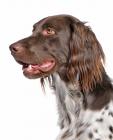
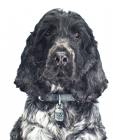

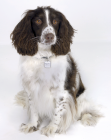
If you like Brittanys, you may like other breeds with similar characteristics »
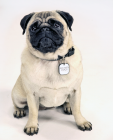

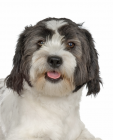
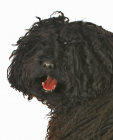
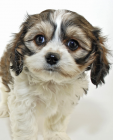
Advice on choosing your breed »
Find an animal shelter or rescue home where a Brittany is waiting for a new home »
The Brittany is right for you if you are looking for a medium sized athletic dog who is agile and light on his feet, loves his vigorous exercise and the great outdoors. Is good with strangers and peaceful generally with other animals, which also excels in a variety of competitive canine actives. If you don’t want a dog that can be hyperactive at times especially when not given enough exercise, if you can’t cater for his needs he can suffer from anxiety separation when left alone, a dog that needs regular brushing and a dog that follows his nose right out of sight then the Brittany may not be the right dog for you. Assess his needs first an judge it from that. If you aren’t able to match his level of enthusiasm and energy then maybe think of another choice in breed. He is very clear in what he wants and needs, and so must you be.
Be the first to rate this breed »
|
*PLEASE NOTE: All our breed profiles are general, and all dogs are individuals. Always talk to the breeders and meet the owners you are buying from. Try to meet the dog and its parents if it is a puppy in their home environment.










